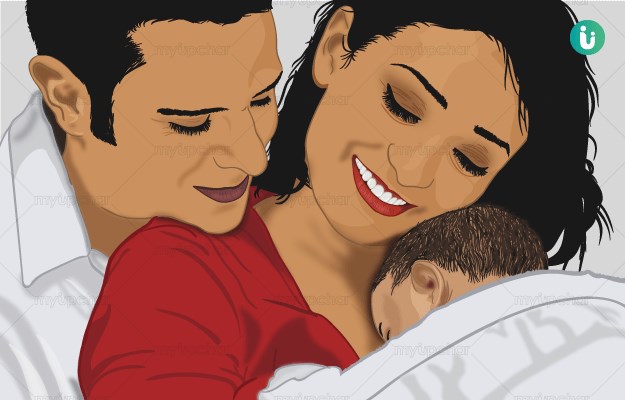Welcome to motherhood! By now, you have probably heard your baby's first cry, had skin-to-skin contact and felt a whole range of emotions in the first hour after the birth of your baby. Now, even as you focus on your little one, it is important to remember that postnatal care for the new mom is of critical importance.
Postnatal care should be a continuation of prenatal care. If anything, it should be given even greater importance as entering motherhood means physical and emotional changes that can take a toll on the mother’s health. Postnatal care for the mother should start right after delivery and last for six to eight weeks.
As a new mother, you will have to rebuild your strength during this period and also make sure that your partner or spouse learns how to care for the newborn. No matter how you delivered your little bundle of joy - through C-section (cesarean delivery) or vaginal delivery - there are two key areas that you will have to focus on in the postnatal period.
Rest in the postnatal period: Being a new parent means getting used to your baby’s body clock. The baby will need to be comforted, fed and his or her diaper will need to be changed every two to three hours. In the first month after birth, babies sleep for 16-18 hours a day and wake up 8-12 times for feeds.
The best way for you to get sleep now will be to nap while the baby sleeps. Often this will not be sufficient - adults need at least seven to eight hours of sleep daily to function normally. Plus, you will have extra work to do - looking out for the baby, feeding, burping, changing, cleaning. However, feeling exhausted this early after delivery is far from ideal. Remember that your body has been through a lot lately - you need to recover from the delivery. Add to that the fact that hormonal imbalance soon after delivery may make you sad or moody.
Nutrition in the postnatal period: There’s no point worrying about weight loss right after you’ve delivered your baby because the primary goal here is to maintain good health. Ideally, you should naturally lose weight during the birthing process and use up the pregnancy weight stores in the following weeks. But if not, you can start with a healthy postpartum weight loss programme eight weeks after delivery. In the meantime, focus on getting enough nutrition to maintain your energy levels - you will need them to take good care of your newborn.
Read more: Tips on getting more sleep when you have a newborn at home
Importance of rest in the postnatal period
Research shows that sleep is essential for our bodies and brains to function normally. Immediately after delivery, this becomes even more important for two reasons.
One, your body has been through a lot already. Periods after pregnancy, vaginal tears, pain and hormonal imbalance will most probably leave you feeling tired and irritable all the time. Your muscles may feel sore and weak for a few days after delivery, and your uterus will take about six weeks to shrink back to normal.
And two, you will be taking on new responsibilities like breastfeeding, and learning many new things (like caring for your baby's umbilical stump till it falls off naturally in about three weeks), which can also add to the feeling of fatigue.
Here are a few tips you could use to rest and recover during the postnatal period:
- Apart from feeding your baby and taking care of yourself, you need to delegate the rest of the work to your spouse, a trustworthy nurse or a relative or friend. Remember that if you don't take care of your health, your baby will suffer too.
- Sleep when the baby sleeps, even if the duration seems short. The hours will add up gradually and you won’t be at the end of your tether.
- Place your baby close by. Do not share a bed with the baby, but keep his or her cot nearby so that getting up and reaching out to the baby doesn’t tire you at any time of day or night.
- While friends and family might want to visit to see your newborn, don’t feel obliged to entertain guests. Instead, if it’s time for the baby’s nap or feed, then go ahead with that so that you can stick to your routine.
- Step outside your home at least once every day so that you get some fresh air and sunlight. If your healthcare provider suggests it, you can even start with some postpartum exercises.
Mood changes and depression after delivery
If pregnancy mood swings are natural due to elevated hormone levels, then they are equally natural after delivery as your hormone levels decrease. This can cause mood swings - particularly feeling low, anxious, frequent crying spells and difficulty sleeping - which are called the baby blues. Usually, the baby blues disappear within two to three weeks, but you should take good care of yourself in the meantime. Communicate with your partner, share your feelings and ask your family and friends for help, if needed.
In many cases, however, the baby blues can take a turn for the worse and lead to postpartum depression. If you still feel fatigued, depressed, experience severe mood swings, loss of appetite and a general lack of happiness beyond two weeks after childbirth, chances are you have postpartum depression. It’s very important to seek medical help to deal with this situation, because many women can suffer from it for years without realising what’s happening to them.
Weight loss after delivery
You might have gained some weight during your pregnancy. During delivery, the baby, the placenta and the amniotic fluid are all removed from your body. So, you will naturally lose a lot of weight immediately after delivery. However, you will still have a baby bump because of your enlarged uterus.
The uterus usually starts shrinking back to normal within hours of delivery, so patience is key here. Don’t try to rush the process of weight loss by putting unnecessary pressure on your body by adopting a diet or cutting off food groups like carbs.
You need ample nutrition in the postnatal period, and can start on a weight loss journey - if absolutely needed - at least eight weeks after delivery.
Read more: How to lose weight after pregnancy
If you are tired of dieting and exercising and are not able to lose weight, then use myUpchar Ayurveda Medarodh Fat Burner Capsule, it has no side effects, order it today and avail the benefits.
Postnatal care for Cesarean C-section delivery
If your doctor decides that you or your baby is at risk, and you need a cesarean or c-section to deliver your baby safely, then you should understand that recovery from it needs a little more care than vaginal delivery.
A C-section is basically the surgical removal of your baby, and it takes between 45 minutes to an hour to perform. The mother is put under general anaesthesia, and two incisions are made - one in the lower abdomen and the second near the uterus.
Since this is a surgery, a new mother who has delivered her baby via C-section has to take care of her surgical stitches and wound, and also take care of the baby. In this case, appropriate help from the spouse, relatives or a nurse is recommended. Here are a few things you need to take care of if you’ve had a C-section delivery.
-
How to treat the C-section incision
-
How to breastfeed after a C-section
-
Postnatal symptoms after C-section
How to treat the C-section incision
Extra care needs to be taken of the C-section incision because if you don’t, it can get infected. Discomfort, fatigue and some pain are natural while recovering from a C-section. Here are a few things you need to keep in mind:
- Your doctor might provide you with painkillers and other safe medications to treat the wound and help it heal faster. Make sure that you do not take more than the recommended dose. You can also apply a heat-pad to help ease the pain.
- Take plenty of rest, and avoid lifting any weight heavier than your baby. Make sure everything you may need is within reach, including your baby and his or her necessities.
How to breastfeed after a C-section
Since you are dealing with a surgical wound in your abdomen, sitting up and breastfeeding your baby might be uncomfortable or simply impossible. You have to make sure that your stitches aren’t under any pressure. To ensure this, here are a few postures you can use to breastfeed your baby without affecting your wound:
- Side-lying hold: Lie down on your side and place your baby on his or her side, facing your breast. Support your baby with one hand, and help him or her latch on to your breast with the other. Once the baby latches on and starts feeding, use one arm to continue supporting the baby and use the other to support your own head.
- Football hold: Hold your baby on your side by supporting him or her with your forearm. Help your baby latch on to the breast with the other hand. Once the baby latches on and starts feeding, use one hand to continue support for the baby, and use the other to support your own head.
Postnatal symptoms after C-section
Just like in the case of vaginal delivery, postnatal symptoms will show up after a C-section delivery. This is because apart from recovering from a surgical procedure, you are also recovering from a pregnancy. You will not experience vaginal soreness, but you will experience vaginal discharge, afterpain or contractions, have tender breasts because you are breastfeeding, have hair loss, and experience mood changes. To learn how to deal with these postnatal symptoms, read our section on vaginal delivery above.
You are also at risk of getting postpartum depression, which will require extra precautions and attention. Make sure you communicate all your feelings - severe mood swings, depressive thoughts and general unhappiness post-childbirth - to your doctor, spouse and friends to cope with this situation better.
Takeaways
World Health Organization data show that most maternal and infant deaths occur within the first month after delivery, with almost half occurring within the first 24 hours. This is, therefore, a very important period. The utmost care and attention are required during the postpartum phase to ensure the good health of mother and child.
The postpartum period is divided into three phases: the first 6-12 hours after birth are known as the acute phase. The next phase lasts anywhere between two weeks and six weeks and the final phase can go up to six months during which the body returns to normal. It's important to look out for any signs of postnatal complications like uterine prolapse and amniotic fluid embolism during this time.
If you are a new mom, make sure to eat healthily, and talk to your doctor and partner about how you are feeling. Baby blues affects 80% of all new moms and are nothing to be ashamed of. While baby blues usually pass on their own, postpartum depression is a more serious condition that requires medical intervention - remember that they are both the result of hormonal imbalance and seeking the help of your doctor, friends and spouse will help you remedy the situation better and faster.
Take the help of an older relative or medical practitioner to learn how to breastfeed - it isn't easy. So if you don't succeed immediately, try not to get frustrated. Some postnatal symptoms are temporary, like hair and skin changes. Try some home remedies for these, if you like. Don't stress about losing the pregnancy weight yet. There is so much to do and soak in. Focus on that, focus on staying happy and healthy.

























